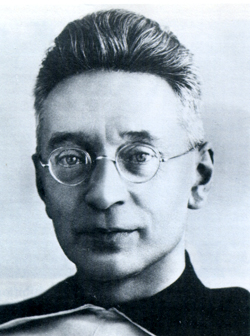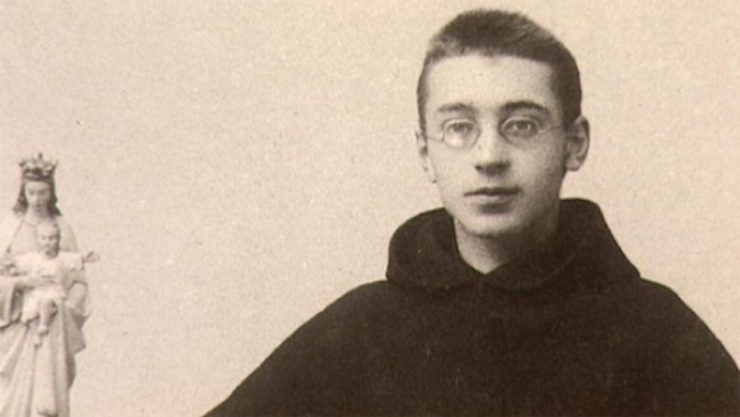
Today we continue our regular series called “Learning from the Saints.” Our guide is expert Bert Ghezzi, a dear friend of mine and the author of numerous books including Voices of the Saints, Saints at Heart, and Discover Christ: Developing a Personal Relationship with Jesus.
His more recent books are The Power of Daily Mass and The Heart of Catholicism. You can learn more about Bert and his work at BertGhezzi.com.
Today, Bert profiles Bl. Titus Brandsma, the patron of journalists whose feast we celebrate today.
It seems almost axiomatic that the closer the saints draw to God in prayer the more likely they are to undertake bold public action in his name. Along with many like Teresa of Avila and Bridget of Sweden, Titus Brandsma illustrates the point.
 For nineteen years Carmelite Father Brandsma taught philosophy and mystical theology at the Catholic University of Nijmegen, which the Dutch bishops had founded in 1923. A widely respected scholar-activist, he organized Carmelite schools for boys, reformed the Carmelite seminary curriculum, and edited a journal on spirituality. He also established a library of medieval spiritual manuscripts, including 300 editions of the Imitation of Christ.
For nineteen years Carmelite Father Brandsma taught philosophy and mystical theology at the Catholic University of Nijmegen, which the Dutch bishops had founded in 1923. A widely respected scholar-activist, he organized Carmelite schools for boys, reformed the Carmelite seminary curriculum, and edited a journal on spirituality. He also established a library of medieval spiritual manuscripts, including 300 editions of the Imitation of Christ.
However, Father Brandsma made his most significant contribution at age 60 as a steely opponent of the Nazis. Johannes De Jong, Archbishop of Utrecht, commissioned him to unite the Catholic press against the Nazi invaders. He drafted a letter urging all editors to refuse to publish Nazi propaganda at whatever cost and personally delivered it to 14 of the most important Catholic papers. Then the German security forces arrested him and jailed him at Scheveningen. He appeared before one official who said he respected Titus’ firm convictions, but regarded him as a “very dangerous person.” Confined to a dark, windowless cell, Father Brandsma gathered spiritual strength in its solitude. He wrote:
“I am completely at home in this little cell. I haven’t been bored once. One the contrary, I am alone, yes, but never has the Lord been so near to me. I could shout for joy that he has allowed himself to be found by me, without me meeting people or people or people being allowed to meet me. He is now my sole refuge and I feel safe and happy. I am willing to remain here always, if he will allow me to. Rarely have I been so happy and content.”
Finally the Nazis sent Titus to Dachau where they forced him to work from 5:30 AM to 7:00 PM. He was sick with uremic poisoning and a severe foot infection, but his captors did not cut him any slack. Repeatedly, they punched, beat and gouged him, leaving him bloody and unconscious in the mud. But Titus frustrated his jailers with his forbearance. “Don’t yield to hatred,” he told other prisoners. “We are here in a dark tunnel but we have to go on. At the end, the eternal light is shining for us.”
Because of his disease, the Nazis ultimately put Titus in the camp hospital, where he endured degrading medical experiments. When they found him too weak for further tests, they killed him with a lethal injection on July 16, 1942.
Six months before, anticipating his martyrdom, Titus Brandsma wrote the following poem that inspired many people throughout Holland:
“Dear Lord, when looking up to Thee,
I see thy loving eyes on me;
Love overflows my humble heart,
Knowing what faithful friend Thou art
A cup of sorrow I foresee,
Which I accept for love of Thee.
Thy painful way I wish to go;
The only way to God I know.
My soul is full of peace and light;
Although in pain, this light shines bright.
For here Thou Keepest to They breast
My longing heart to find there rest.
Leave me here freely alone,
In cell where never sunlight shone,
Should no one ever speak to me,
This golden silence makes me free!
For though alone, I have no fear;
Never were Thou, O Lord, so near.
Sweet Jesus, please, abide with me;
My deepest peace I find in Thee.”
Read more from Bert at his website www.BertGhezzi.com, or check out his many books on Amazon.

